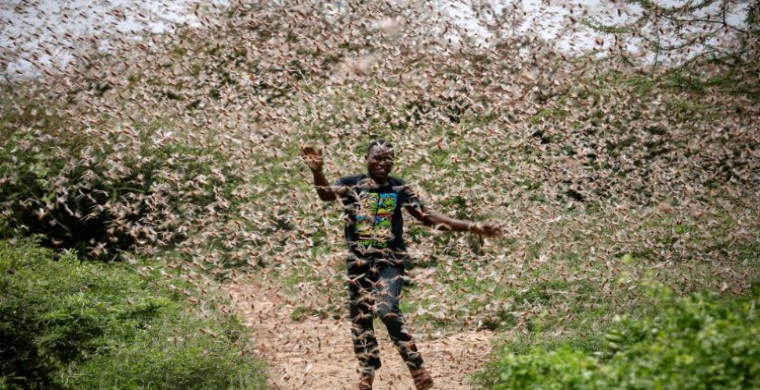Seven African Archbishops including Lord Carey Appeal for help to combat Locust Plague
By Chris Sugden
Special to Virtueonline
www.virtueonline.org
March 12, 2020
Ravenous locust swarms, originating in Oman, have already swept across East Africa, with devastating impact. Now it is spreading east to Iran and Pakistan. Thousands of Kenyan Christians facing food shortages in the badly hit Pokot region have just sent out an urgent call. Uganda is also badly hit.
Lord Carey, Archbishops Stanley Ntagali (former APB of Uganda), Stephen Kaziimba (Uganda), Jackson Ole Sapit (Kenya), Masimango Katanda (Congo), Laurent Mbanda, (Rwanda) and Benjamin Kwashi (Jos Nigeria) have issued an appeal for help.
March 2020
Dear Friend,
A plague of locusts is devastating crops and livelihoods. Please help us save God's people.
Thousands of already marginalised and persecuted Anglican Christians are among those facing severe
food shortages as vast swarms of desert locusts caused catastrophic loss to crops. The ravenous swarms are sweeping across East Africa with devastating impact on countries including Djibouti, Eritrea, Ethiopia, Kenya, Somalia, South Sudan. Tanzania and Uganda. The UN has warned the region is on the verge of a food crisis.
Anglican Archbishops and bishops from the region and from Pakistan are uniting with Barnabas Fund in our appeal to brothers and sisters worldwide. We urgently need your gifts to save the lives of many thousands.
Double disaster in flood-struck and drought-afflicted regions of Kenya
Taratam, an 85-year-old Kenyan Christian farmer, told Barnabas Fund, "These locusts destroy many things. They destroy vegetables leaving people in famine. They are eating grass and leaves which cause the livestock to die, leaving the people without animals, which then cause the people to die."
A double disaster has hit thousands of Christians in Kenya who are now facing acute food shortages. In Marsabit county, unusually heavy rains brought flooding last year. In contrast, in the semi-arid East Pokot region, the rains expected last year did not come.
Then the locusts invaded. With crops and pastures devoured and livestock dead, communities are facing potential famine. The government is battling to control the spreading infestation with overstretched resources. If uncontained, the plague could increase five-fold by June.
Food relief is needed to save the lives of many Kenyan Christian families. Widows, orphans, pregnant women, children and elderly Christians are all especially vulnerable.
Normally lush and green farmland in the Ethiopian highlands "looks like desert."
The locusts are deepening the serious humanitarian crisis in Ethiopia, where seven million people were already at risk of food insecurity due to drought and conflict. Normally lush and green, the highland vegetable farms "look like a desert" in the wake of the devouring swarms. Pasture for livestock have also been gnawed to stubble. Around 10,000 Christian families saw their vital subsistence food crops wiped out. They need urgent food aid to replace vanished staple food supplies.
30,000 acres ravaged in Pakistan
The scale of the 2020 locust invasion is almost unheard of in Pakistan. The insects have struck the Sindh province -- one of the poorest rural regions of Pakistan. Thousands of Christian farming families are facing severe food shortages. The cotton harvest -- an important cash crop -- was devoured by the insects leaving many without an income.
Locusts pour into Uganda and crisis-torn South Sudan
A mature swarm of desert locusts across from western Kenya poured into north-east Uganda in February. The insects caused significant destruction in the border districts and concerns are growing that there will be a huge loss of food crops, and pasture in the cattle corridors, as the insects breed and spread rapidly.
Swarms were also recorded in crisis-ridden South Sudan, which is already struggling with widespread food insecurity after years of civil war.
You can help save thousands of lives in East Africa and Pakistan this Easter.
Christians in regions where they are despised and discriminated against are especially at risk at times of famine.
An Easter gift for hungry Anglicans
As Easter approaches, we joyfully remember with our hungry suffering family the everlasting hope, peace and power of the resurrection of our Lord Jesus Christ. May we ask you to prayerfully consider giving an Easter gift of £20/$26 to help feed those left hungry and overwhelmed by the locust plague, most of whom also already face daily discrimination or persecution?
Please help our brothers and sisters if you can. But, above all, remember them in your prayers.
THE RT REV. AND RT HON. THE LORD CAREY OF CLIFTON
Patron of Barnabas Fund
THE MOST HON. THE MARQUESS OF READING
Barnabas Fund Chairman
Supporters of the Appeal
Archbishop Masimango Kåtanda (Congo)
Archbishop Laurent Mbanda (Rwanda)
Archbishop Stephen Kaziimba Mugalu (Archbishop of Uganda)
Archbishop Stanley Ntagali (former Archbishop of Uganda)
Archbishop Jackson Ole Sapit (Kenya)
Archbishop Benjamin Kwashi (Jos, Nigeria)
Bishop Mwita Akiri (Tarime, Tanzania)
Bishop Zechariah Manyok Biar (Wanglei, South Sudan)
Bishop Irfan Jamil (Lahore, Pakistan)
Bishop Kaleem John (Hyderabad, Pakistan)
Bishop Leo Rodrick Paul (Multan, Pakistan)
"I will repay you for the years the locusts have eaten... You will have plenty to eat, until you are full, and you will praise the name of the LORD your God, who has worked wonders for you ..." (Joel 2:25-26)
March 2020
SAVING GOD'S PEOPLE FROM STARVATION
Barnabas Fund Easter Appeal
£8/$10* could provide 15kg of wheat in Ethiopia
£15/$19* could provide 30kg of rice in Pakistan
£6/$8* could provide 20kg of maize in Kenya
*Costs and specific needs can vary between countries and/or regions.
For another take on this issue click here: file:///C:/Users/David/Downloads/Easter-Appeal-Letter-2020-Anglican-Mainstream%20(1).pdf














